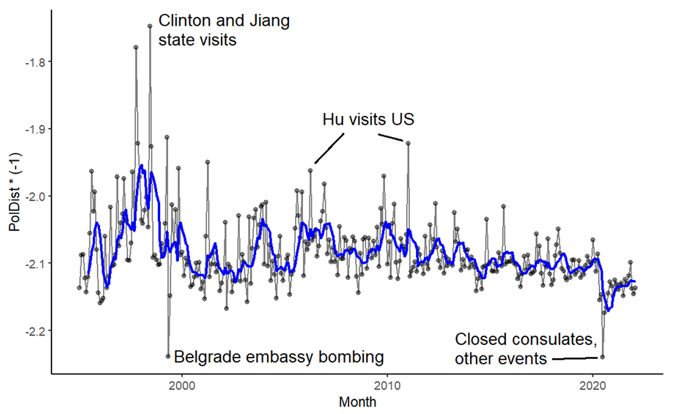| Author Name | Samuel HARDWICK (The Australian National University) / Shiro ARMSTRONG (Visiting Fellow, RIETI) |
|---|---|
| Download / Links |
This Non Technical Summary does not constitute part of the above-captioned Discussion Paper but has been prepared for the purpose of providing a bold outline of the paper, based on findings from the analysis for the paper and focusing primarily on their implications for policy. For details of the analysis, read the captioned Discussion Paper. Views expressed in this Non Technical Summary are solely those of the individual author(s), and do not necessarily represent the views of the Research Institute of Economy, Trade and Industry (RIETI).
Do countries with better political relations trade more with each other? Do those with political tensions trade less? A vast and rich literature shows a complex relationship between trade and political relations over centuries.
Trade is likely to reduce political hostility and military conflict, but not always, and political closeness or tension only sometimes affects trade. In some circumstances, countries have continued to trade while at war with one another. The literature tells us that whether countries trade freely or along geopolitical lines depends on conditions specific to the trading relationship and time period in question. The institutional context within which countries are trading matters.
Without the multilateral rules and norms of the global trading system, underpinned by the GATT and WTO, international trade is more likely to be ruled by might and driven by political alliances. This dynamic was observed in the interwar period and throughout the Cold War.
Governments are less able to deploy trade-restrictive policies to punish countries over disagreements when those policies breach multilateral rules. Moreover, signing up for and implementing these rules often require institutional reforms that make intervention in the domestic and international markets more difficult. These include reforms that increase transparency, predictability and consultation around policies. The effect of WTO membership on institutional reform was studied and written about extensively in the lead up to and after China’s accession to the WTO in 2001.
This paper examines the ways that institutional conditions, including the membership of the WTO, might reduce the effects on trade of the ups and downs of political dealings between countries. Joining the WTO typically requires building domestic institutional capacity in addition to making commitments on international rules. We propose that through strengthening domestic institutions and signing onto international rules that tie the hands of governments and make protectionist or nationalist policies less appealing, joining the WTO can have the dual effect of both increasing trade and reducing the responsiveness of trade flows to political vicissitudes.
In an era of great power competition between the world’s two largest economies, it is important to understand the effect of political distance on trade and the ability of the WTO to constrain protectionism and limit the deployment of trade sanctions for geopolitical purposes.
To examine these effects, we construct an index of political distance based on conflict and cooperation events involving a pair of countries over a certain time period. Political distance can mean simply how close (friendly) or far (antagonistic) two countries are at a particular point in time. Indexes of political relations based on events data are widely used in political science and economics. Here, it is constructed using high-frequency data from the Global Database of Events, Language, and Tone (GDELT, 2022). As an example, the monthly index of political distance is shown for China and the United States in the Figure.

We show that monthly data, rather than quarterly or annual, best reflects the time horizons of political shocks to trade, and estimate a set of structural gravity models using monthly panel data. Gravity models are the workhorse of international economics and help explain the effect of distance, economic scale and other variables, on trade, and we’ve included the index of political distance and whether countries are WTO members, democracies, and a measure of the quality of their domestic governance.
We find that WTO membership, democratic political systems and strong domestic governance institutions are associated with a reduced impact of political vagaries on trade between countries. A strengthened WTO and multilateral trading system can reduce the effect of politics on trade. These findings are relevant and important to understand in the context of confidence in the WTO waning due to outdated rules and both China and the United States, the largest two traders and economies, undermining those rules by deploying trade sanctions for political gain. One of the main results is that WTO membership is associated with a weaker effect of politics on trade, whether one or neither trading partner is classified as a democracy. This dampening effect of WTO membership is stronger when recent years (2017 to 2021), when U.S. and Chinese actions were more acute, are excluded from the sample.

